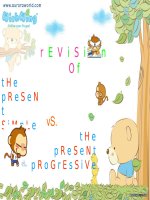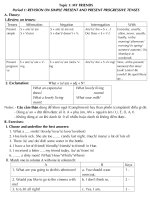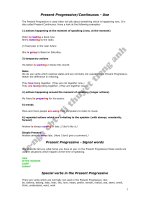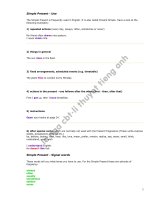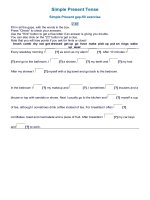present simple
Bạn đang xem bản rút gọn của tài liệu. Xem và tải ngay bản đầy đủ của tài liệu tại đây (281.98 KB, 3 trang )
Teacher: Did you father
help you with
your homework?
Student: No, he did it all by
himself.
FORMS USE TIME PHRASES
A: I worked /went.
He/she/it worked/went.
You/we/they worked/went .
N: I did not (didn’t) work_/go.
He/she/it did not (didn’t) work_/go.
You/we/they did not (didn’t) work_/go.
Q: Did I work_/go?
Did he/she/it work_/go?
Did you/we/they work_/go?
1-Action that started and finished in
the past:
I met my friend yesterday.
Did you go to the seaside last
summer?
2- Actions that happened one after
the other in the past:
He opened the door, switched on the
light and fed his cat.
3- Action taking place in the middle
of another (longer) action:
He fell asleep while the teacher was
explaining new grammar rules.
yesterday, 2
minutes/hours/days/y
ears ago,
in 1970,
the other day,
last month/year/
week/ Sunday
Regular verbs + ed : worked, played,
Irregular verbs – II column:
went, ate
!
!
GRAMMAR-GUIDE
GRAMMAR-GUIDE
LET’S REVISE PAST SIMPLE!
LET’S REVISE PAST SIMPLE!
He bought a new car
two months ago.
Where were you last night?
A:
N:
Q:
I/he/she was not (wasn’t) at home yesterday.
You/we/they were not (weren’t) at home yesterday.
I/he/she/it was at home yesterday.
You/we/they were at home yesterday.
Was I/he/she/it at home yesterday?
Were you/we/they at home yesterday?
PASR SIMPLE OF TO BE
!
!
1. If a verb ends in a vowel + y
no changes: play – played stay –
stayed
2. If a verb ends in a consonant + y,
the y changes to i before the ending
–ed: hurry - hurried study -
studied
3. If a verb ends in –e, we add –d:
dance - danced
4. If a verb ends in vowel + consonant we
double the consonant and if the verb has
more than one syllable we double the
consonant only if the final syllable is
stressed:
stop – stopped permit - permitted
1. If a verb ends in a vowel + y
no changes: play – played stay –
stayed
2. If a verb ends in a consonant + y,
the y changes to i before the ending
–ed: hurry - hurried study -
studied
3. If a verb ends in –e, we add –d:
dance - danced
4. If a verb ends in vowel + consonant we
double the consonant and if the verb has
more than one syllable we double the
consonant only if the final syllable is
stressed:
stop – stopped permit - permitted
SPELLING OF - ED
(REGULAR VERBS)
!
!
REMEMBER!
die – died
travel -
travelled
REMEMBER!
die – died
travel -
travelled
PRACTICE TIME!
PRACTICE TIME!
smile - ………… cry -
…….......
tie - ………… worry-
………… tidy - ………... drop
- ………… like - ………….
visit - …………. prefer -
………….. stay - …………. rub -
………….. finish - ………….
travel - ………….. clap -
………….
1.Write the past simple form
of these regular verbs:
1.Write the past simple form
of these regular verbs:
2. Fill in the gaps with
the missing forms of
these irregular verbs:
2. Fill in the gaps with
the missing forms of
these irregular verbs:
InfinitivePast SimpleInfinitivePast
Simplewentcostflythoughtbuyreadgotfalls
peakmadewritemeet
3.Match the use of Past
Simple with the sentences:
3.Match the use of Past
Simple with the sentences:
A: Action that started and finished in the
past;
B: Actions that happened one after the
other in the past;
C:Action that took place in the middle of
another (longer)action
1.Our family moved to this flat last year. .A..
2.The door opened and a new teacher came into
the class. ……..
3.He was very afraid of dogs when he was a child.
………
4. I was watching a terror film when someone with
a mysterious voice phoned. ………
5. Christopher Columbus discovered America in
1492. ……….
6. Mother came into the room just when her
children were watching cartoons. ……..
7. There were some nice cafes here ten years ago.
……….
8.She left the room and the baby burst out of
crying. …….
9.While she was speaking on the phone, the dog
stole a piece of meat. ……..
4.Rewrite this text
in Past Simple:
4.Rewrite this text
in Past Simple:
Tom wakes up when it is already quite
light. He looks at his watch. It is a
quarter to seven. Quick! He jumps out
of bed and runs to the bathroom. He
has just time to take a cold shower and
drink a glass of tea with bread and
butter. He is in a hurry to catch the 8
am train. At the railway station he
meets his friend. But he doesn’t have
much time to chat with him. He catches
his train and it takes him forty minutes
to get to his work.
PRACTICE TIME!
PRACTICE TIME!
William Shakespeare ………… (be) born in Stratford-on-Avon on April 23, 1564. He …………(go) to the
local Stratford Grammar School, where he ………….(be) taught by Master Walter Roche. Lessons
…………..(begin) at six o'clock in the morning in the summer in order to make the most of daylight.
His father ……….(be) called John Shakespeare a Stratford upon Avon glove-maker. He …………. (send)
William to the local grammar school in 1571, but when William ……….(be) only 14 years old his fortunes
……….(fall) so low that William had to leave school. Some historians say he ………… (work) in his
father's shop.
At the age of 19 William …………. ( marry) Anne Hathaway the daughter of a rich farmer near Stratford.
Three years later Shakespeare …………(go) to London. How he ………… (live) there we do not know.
In about 1587 he ………….. (become) a member of one of the few theatrical companies which ………….
(exist) in those days. Around 1590 he ……….. (begin) to try his hand at writing plays. There …………….
(be) no female actors in those days, all the female parts ………….(be) played by boys. It is thought that
he ……….. (write) his first major play, Henry VI., Part One, in 1592.
His most famous play, Hamlet, ……… (be) probably first seen in 1601 at the Globe Theatre. Shakespeare
………….. (continue) to write about 2 plays a year.
He …………. (return) to Stratford in 1612, where he (live) the life of a country gentleman. He …….. (die)
of a fever on his birthday in 1616. From />5. Simple Past gap-fill exercise. Fill in all the gaps,
with the right form of the verb in brackets:
5. Simple Past gap-fill exercise. Fill in all the gaps,
with the right form of the verb in brackets:
Paul. What _______________________________ (you/do) in the summer?
Sam. I _________________________________ (go) on a tour of Europe.
Paul. __________________________________ (it/be) expensive?
Sam. No, I ______________________________ (buy) a railcard and it
__________________ (be) quite cheap.
Paul. __________________________________(you/go) on your own or with some
friends?
Sam. My friend Susan ________________________________(come) with me.
Paul. How many countries __________________________________ (you-visit)?
Sam. I___________________________(visit) seven countries. We ___________(have)
a good time and I really ______________________ (love) all of them.
Paul. Which one _____________________________ (you-like) most?
Sam. England, I think. The countryside _______________________ (be) fantastic and
we ___________________________(take) lots of photographs.
Paul. When _______________________________ (you- arrive) back home?
Sam. I _______________________ (get) back last week.
Paul. _____________________________ (you-buy) some presents?
Sam. Yes, I ____________________________ a T-shirt for my brother and another for
you. Here you are.



